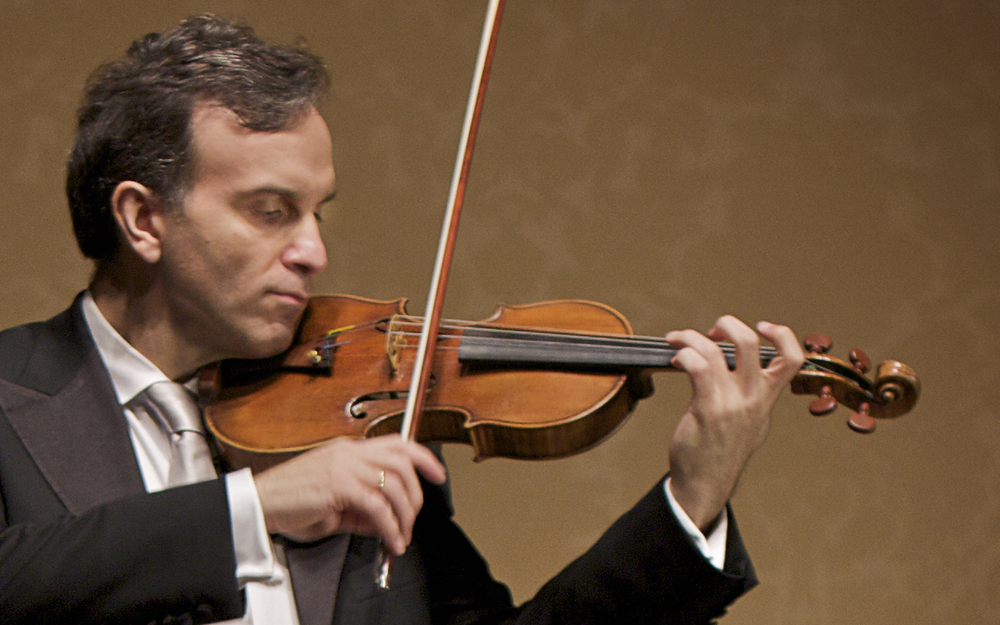Shaham gives bold and colorful advocacy to new works at Jordan Hall

Gil Shaham offered a wide-ranging recital Sunday afternoon at Jordan Hall for the Celebrity Series.
If you went to the trouble of digging your car out of the snow banks Sunday to make the trip to Jordan Hall to hear Gil Shaham, by recital’s end it was clearly worth the effort.
The blizzard and travel delays–Shaham had just arrived in Boston from a cross-country flight Sunday morning–may have contributed to somewhat tepid readings of Schubert and Bach, but the newer works on the program sparkled with color and zest.
Celebrated violinist Shaham and acclaimed pianist Akira Eguchi opened their Celebrity Series recital with an elegant but cautious reading of Schubert’s Sonatina in A minor, D. 385. Each musician complemented the other with elegant phrasing in the four movements of this light-hearted work. Shaham, with a sweet, warm violin tone, performed the angular vocalise passages in the first movement with grace. And he and Eguchi approached the third movement minuet with a delicate touch. But in the duo’s sweet and understated approach to the music, at times, felt a little flat. In particular, the softer passages in second and fourth movements suffered in tone and intensity.
Shaham followed with an equally soft-focus reading of Bach’s Partita No. 3 in E Major. After a false start, he ventured into an energetic but nervous Preludio. And his careful approach unfortunately brought slight intonation problems and less focused phrasing in parts of the Loure and Minuet movements. The music danced, but lacked steam. Still, in the Gavotte en Rondeau and quicker dances, Shaham began to relax and open up, rendering the music with warm, supple tone. He offered a bold and convincing conclusion to the Partita with the Bourée and Giga.
Shaham’s playing was more dynamic and colorful in the recital’s second half, which comprised works written especially for him over the past two years.
One of those, William Bolcom’s Suite No. 2 for solo violin, co-commissioned by Shaham and the Celebrity Series, was heard in its East Coast premiere.
Bolcom’s Suite incorporates an eclectic mix of styles, from bird calls and twelve-tone music to blues and Jewish nigun. It is also a study in violin sonority. “Lenny in Spats,” a musical depiction of a dolled-up Leonard Bernstein, is a short, bluesy number set in whistling violin harmonics. “Barcarole” incorporates simultaneous bowed double stops and left-hand pizzicatos. “Dancing in Place” calls for pizzicato and hammer-on playing with the left hand for some of its musical material. “Fuga malinconica” is a two-voice fugue on a twelve-tone theme. The “Tarantella” featured Shaham in clean, rapid-fire passage work.
The violinist approached each of the nine movements with controlled expression, crystalline precision, and sensitivity to the music’s ever-changing moods. Onstage following the performance, Bolcom told the audience, “This is the nicest seventieth birthday present for my wife Joan (Morris),” gesturing towards her seat in mid house. The composer, at the piano, then accompanied Shaham in a duo perfomance of Happy Birthday to Morris as the audience sang along.
Following that impromptu encore, Eguchi rejoined Shaham for an inspiring performance of Julian Milone’s poetic In the Country of Lost Things. . .
Cast in one continuous movement, Milone’s piece, commissioned by Shaham in 2011, is loosely based on Paul Auster’s post-apocalyptic novel with the similar title, In The Country of Last Things. Milone, a London-based violinist and composer, uses harmony that is tonal but chromatically expansive, built upon falling motives that coalesce into uneasy dissonances. The only resolution comes with the final major chord stretched between violin harmonics and subdued middle-range piano voicing.
The opening contains searching and mournful phrases–drawn from oscillating half steps–that grow in intensity. As in the Bolcom, Shaham’s violin tone here was bolder and more colorful. Eguchi played with a delicate touch but provided appropriate punch and strength to his sound. The music’s central section featured Shaham and Eguchi in snap-precision syncopation and compound rhythms.
The duo maintained that energy in Avner Dorman’s dramatic Nigunim for violin and piano, which closed the recital.
Cast in four movements, Nigunim, composed for Shaham and his pianist sister, Orli, is an exploration of Jewish improvisatory song (nigun) from around the world. Some nigun, the Israeli-born Dorman notes, are religious, others are secular. The melodies can also be quick, slow, mournful, or victorious. Rather than quote specific folk themes, Dorman, in Bartokian fashion, weaves the modal sound and melodic shape of the music into Nigunim.
Shaham and Eguchi performed with a wide range of intensity. Shaham, in sul ponticello playing, and Eguchi, through sparse chords, created sensations of distance and yearning in the elegiac first and third movements.
They performed the second movement–which contains echoes of Ashkenaic folk music–with agitated intensity. And the two musicians were fiery, even brazen in the finale, a tour-de-force of Bartokian driving rhythms and cluster-chord clamor.
Before sending everyone back into the driven snow, Shaham and Bolcom offered a smooth reading of the latter’s rag-tinged Graceful Ghost as an encore, providing a heart-warming musical coda to Boston’s cold, wintery weekend.
The Celebrity Series will host guitarist Miloš Karadaglic 8 p.m. Wednesday and Thursday at Pickman Hall. celebrityseries.org; 617-482-6661
Posted in Performances




